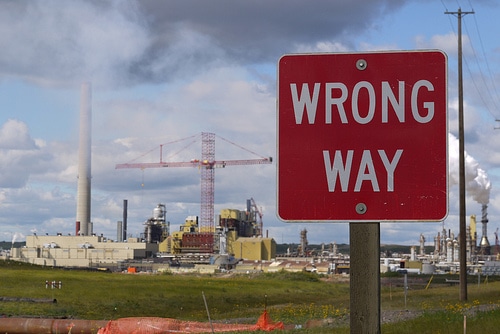In July 2009, Alberta Premier Ed Stelmach created the Premier’s Council for Economic Strategy. This 12-member council of various global experts was convened to provide guidance on how the province should maintain its prosperity through 2040. Earlier this month, after nearly two years of research, public meetings and private debate, the experts released their long-awaited scoping report, Shaping Alberta’s Future: Report of the Premier’s Council for Economic Strategy [pdf].
Together they sought to answer [pdf]: “What intentional choices should Albertans be making now to shape our future, the future of our grandchildren and the future of our province?”
According to council Chair David Emerson, a business executive and former federal cabinet minister, the council took a distinctive approach when evaluating Alberta’s future: “Our starting place was a strong conviction that “business-as-usual” is not an option for Alberta.”
The council does call on the province to continue developing its dirty tar sands oil, at least for the time being. But, in a break from the norm, this group of experts emphatically advocates for an immediate reorientation of Alberta’s short-term and oil-dependent development strategy. The authors make clear that the tar sands are environmentally damaging, and serve as a dangerous distraction from the need to forge a path toward sustainable development.
In charting Alberta’s future, the council recognizes that relentless tar sands expansion cannot support a growing population and an entire economy in the long term. In fact, Alberta’s reliance on exploiting the destructive tar sands places the province in a highly vulnerable position, since oil revenues are necessary for the province to fill the gap between tax revenues and minimum expenditures on public services.
The pollution and ecological destruction stemming from tar sands development is also fast overshadowing the short-term economic benefits associated with the heavily subsidized crude oil projects. The report describes the fate of the province as follows:
“Alberta’s prosperity currently depends on the sale of energy to the U.S., and increasingly on oil sands as the source of that energy. The province is vulnerable as a result. We say this not because there is a danger of running out of raw materials – Alberta’s energy resources are massive – but because the production costs of heavy oil from oil sands are among the highest in the world, and because our reputation for orderly and responsible development is under attack.”
“We need the discipline to execute plans to broaden the economic base over the long term, starting now and staying the course consistently over many years.”
Considering that countries all over the world are trying to reduce their carbon pollution and dependence on dirty fossil fuels, the council found that if there was ever a slowdown in tar sands oil exports, or if oil was replaced by lower-cost cleaner alternatives, then “no other sector of the [Albertan] economy is in a position to even come close to replacing the jobs and wealth created by the energy sector.”
Underlining the importance of taking this report and its implications seriously is the fact that in the last week, the province has suffered its worst oil spill in 35 years. Approximately 4.5 million liters of oil (28,000 barrels) leaked into a wetland area some 30 kilometers from the mainly Lubicon Cree Nation hamlet of Little Buffalo, 460 kilometers from the provincial capital, Edmonton.
As expected, band spokesman Garrett Tomlinson said residents are worried about this spill:
“The biggest concern that’s been identified is the aftermath that’s going to be left behind by this environmental catastrophe. What the long-term environmental and health impacts are going to be for the people here…and how we’re going to move forward to mitigate those negative impacts…”
Ironically, the spill was contained by a beaver dam and not by the pipeline’s owner, Plains Midstream Canada, the Canadian arm of Rainbow All American Pipeline, which was also the source of a leak of some 200,000 liters of oil near Slave Lake in 2006.
In January, Canadian Prime Minister Stephen Harper received and rejected a report from a Conservative-leaning advisory panel – one which he appointed – because the members called for Canada to cut its carbon emissions and take strong action on climate change.
Here’s hoping that Alberta Premier Ed Stelmach – who hand-picked the members of Alberta’s Council for Economic Strategy – acts differently and takes heed of this latest report. It’s the only responsible approach, especially given the recent health threat and disaster in Little Buffalo, and the ongoing environmental degradation caused by the ultra-dirty tar sands.
Subscribe to our newsletter
Stay up to date with DeSmog news and alerts







